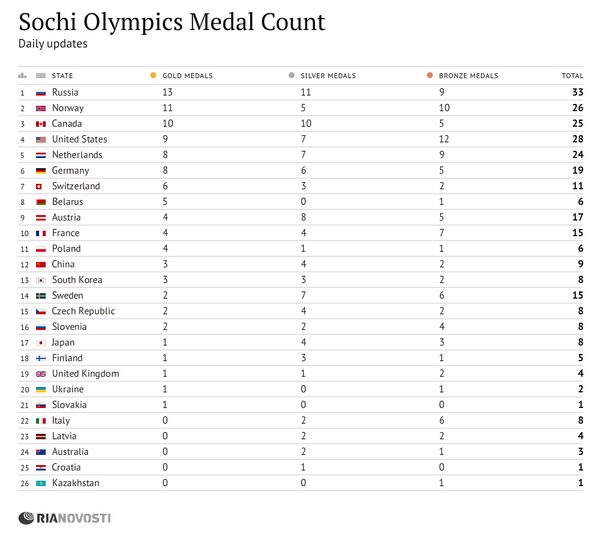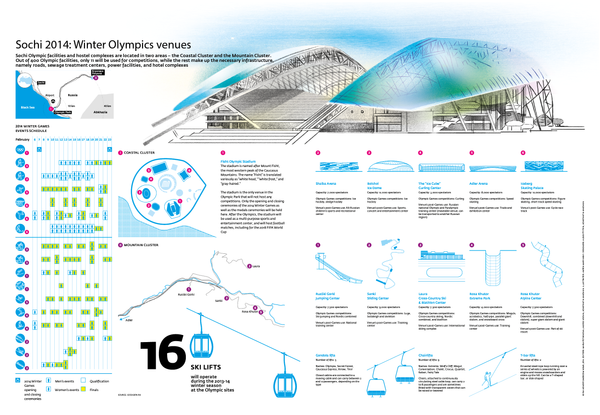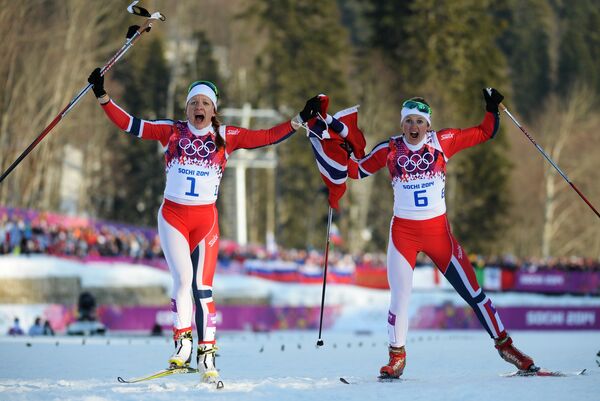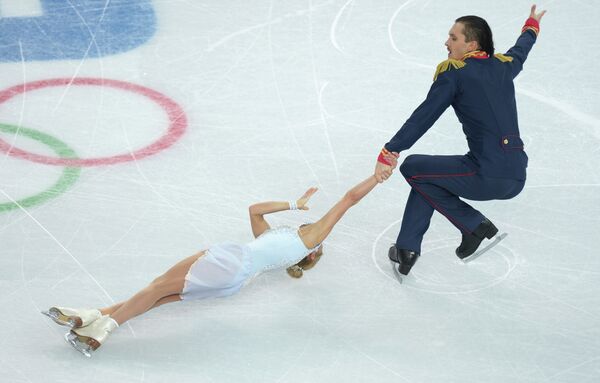SOCHI, February 11 (R-Sport) – Day four of competition at the Sochi Olympics saw an exhibition of Norwegian endurance skiing and a man nicknamed "iPod" shuffle to gold in the halfpipe, while snowboard king Shaun White lost his Olympic crown.
The list of Sochi female firsts extended too, with a German soaring to the inaugural women's ski jump title, 90 years after the men's event debuted at the Olympics, plus the first women's ski slopestyle gold going to Canada.
At the Laura biathlon complex, Norway won two cross-country sprint skiing gold medals in the space of 10 minutes as Ola Vigen Hattestad won a crash-marred men’s final after Maiken Caspersen Falla took women’s gold.
Hattestad took the gold by 1.22 seconds from Sweden’s Teodor Peterson. The two had been in a race of their own after the other four in the final were wiped out by fall and crashes.
Another Swede, Emil Joensson, eventually trailed over the line to claim the bronze medal, 19.74 seconds off the pace.
"I didn't realize there was a crash there, so I was at the top of the hill and I looked behind and I just saw Peterson. It was a weird feeling," Hattestad said.
There have been a higher than usual number of fallers in biathlon and cross-country races at the Laura complex after warm temperatures over the last three days made the snow soft.

Across the valley at Rosa Khutor, US star Shaun White failed in his bid to become the first three-time Olympic snowboard champion, the crown passing to Switzerland’s Iouri Podladtchikov.
Moscow-born Podladtchikov, the reigning world champion nicknamed "iPod," laid down a breathtaking run to score 94.25 points for the win, while White remained without a medal in fourth after twice stumbling on his last run.
Podladtchikov is the second athlete to win gold in Sochi after having switched allegiance from Russia to another country. The first was Slovakia’s Anastasia Kuzmina in the women’s 7.5km biathlon sprint Sunday.
The silver and bronze both went to Japanese riders, Ayumu Hirano and Taku Hiraoka, who scored 93.50 and 92.25 respectively to become the first snowboarders from any Asian country to win Olympic medals.
The result was all the more galling for White because he had pulled out of the inaugural slopestyle event last week citing the risk of injury. His compatriot Sage Kotsenburg won gold in his absence.
Meanwhile, Belarus’ Darya Domracheva demolished her opposition as she shot to gold in the 10 kilometer biathlon women’s sprint at the Sochi Olympics.
Near-flawless in both skiing and shooting – even a missed final shot and resulting penalty loop made little difference to her lead – Domracheva won by the vast margin of 37.6 seconds to become the first Belarusian woman ever to win Winter Olympic gold.

Norway’s Tora Berger took the silver, added to her individual gold from Vancouver 2010, after a prolonged battle through the pack after starting in 10th. The bronze went to Teja Gregorin of Slovenia, her country’s first medal in biathlon, after she overtook much-fancied Czech Gabriela Soukalova late in the race.
Canada sprung fast out of the blocks in Sochi and maintained the pace on Tuesday as Canadian Dara Howell won the first-ever Olympic gold medal in slopestyle.
Howell’s first run combined speed and big air for an almost unheard-of score of 94.20 points in the discipline, a festival of tricks on rails and jumps.
"That will go down in history. I am so proud," Howell said. "It's huge for Canada. I'm happy to bring home another gold medal for Canada. The hard work has paid off."
After several star names failed to make the final and others crashed out, the silver medal went to Devin Logan of the United States with a score of 85.40, with the bronze for Canadian Kim Lamarre with 85.00.
Germany’s Carina Vogt flew into the history books by becoming the first-ever Olympic women’s ski jumping gold medalist.
Ninety years after men’s ski jumping debuted at the Olympics, Vogt shed her outsider status – she had never before won any major competition – to win with a score of 274.4 points.
The silver medal went to Austria’s Daniela Iraschko-Stolz on 246.2, with bronze for 18-year-old French jumper Coline Mattel on 245.2 on a podium remarkable for the absence of some of the sport's leading lights.
Japanese 17-year-old Sara Takanashi had come to Sochi as the hot favorite for gold after dominating the World Cup season, but had to settle for fourth, while host nation hope Irina Avvakumova of Russia could manage only 16th.
Down on the Black Sea coast, meanwhile, Tatiana Volosozhar and Maxim Trankov picked up where they left off in the team figure skating event to win the short program and take a five-point lead into Wednesday's free skate in search of a second Sochi gold.
Volosozhar and Trankov set world record score of 84.17 points in their flawless routine set to "Waltz Masquerade" at the Iceberg Skating Palace.
Aliona Savchenko and Robin Szolkowy, the only pair to have beaten Volosozhar and Trankov in the last two years, performed a dazzling short skate to music from "The Pink Panther," securing the veteran German bronze medalists from Vancouver a total of 79.64 and second place.
Russia's No. 2 pair Ksenia Stolbova and Fyodor Klimov were third after scoring 75.21, while the other Russian duo, Vera Bazarova and Yuri Larionov, could only manage 69.66 for eighth place.
Wednesday sees the pairs medals decided in the figure skating, the women's Alpine skiing downhill, the men's 1,000 meter speedskating, the luge doubles, and the women's halfpipe in snowboarding.
After four days of competition, Norway and Canada lead the medal table on four golds, with the Scandinavians ahead courtesy of two more bronze. Then come the Netherlands and Germany on three golds apiece and the United States and Switzerland on two.
Russia has the joint-fourth highest medal total with seven, but just one gold so far leaves the hosts in seventh.



